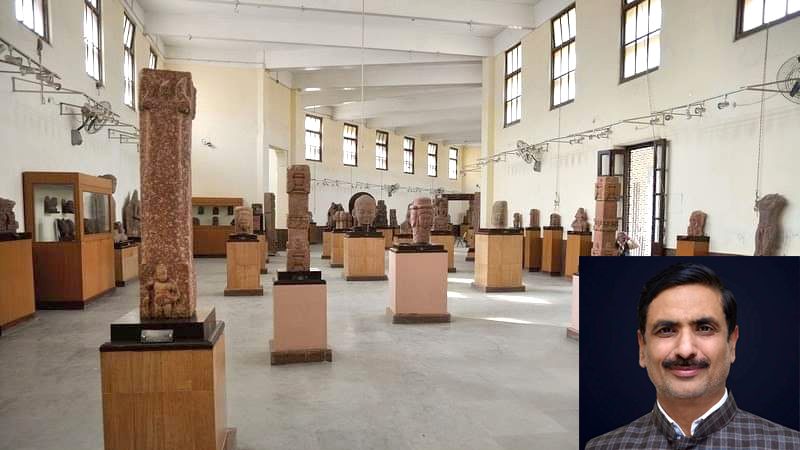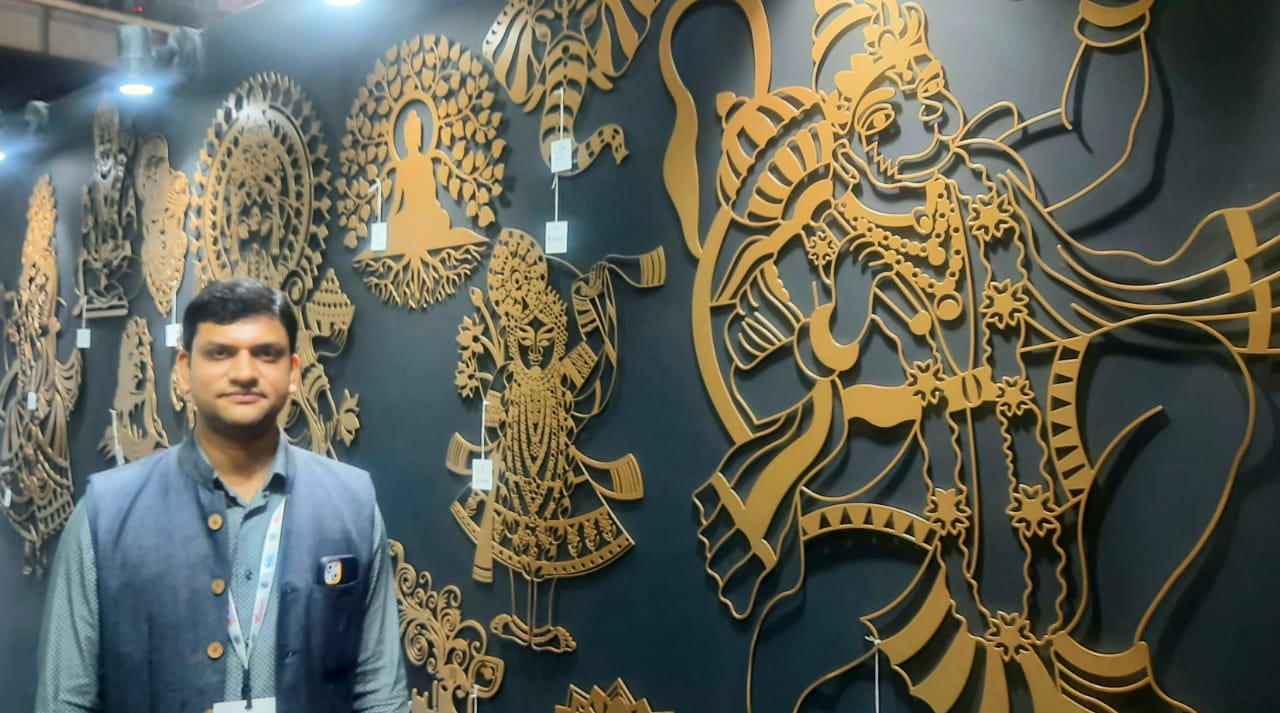Amogh Lila Prabhu is the Vice President of Dwarka ISKCON Temple. Amogh Lila ji is not only a monk at ISKCON, but he is a spiritual master showing the path to the young generation by his wonderful speeches. A trained software engineer, he got the job in 2004 and worked till 2010. In 2010, on #Janmashtami, by going to ISKCON, he became a forever Hare Krishna brahmachari. What could be a better day than the Janmashtami, when he transcended to spiritual life from the mundane, to bring an exclusive interview of Amogh Lila Prabhu ji on #Krishna consciousness and how it can transform the lives of people through certain practices.
1. What’s Krishna consciousness? How does it impact the life of a person?
Krishna consciousness is a natural state of consciousness, and that originally happens when God creates the living entities, so the natural function of the soul is to be Krishna conscious. So, when the soul comes in the material world, then we get covered up by the three modes of consciousness – truth, passion, and ignorance, which are known as Satva, Raja, and Tama Gunas. That covers up our original Krishna consciousness, which is that inherent in all the souls and in the world, whether the soul has taken body in a Hindu family or Muslim ban from the Christian family in India or America or Pakistan or China originally. And that is a consciousness that the soul is having and being Krishna conscious, we are conscious of God. We are conscious of God in the sense we are conscious of the glories of his names, glories of his attributes, glories about his beautiful form, spiritual and divine form. Also, we are conscious of his divine activities, his paraphernalia, his dealings. So being always conscious of the glories in form, qualities, attributes, activities, paraphernalia is known as Krishna consciousness. Basically, it is the highest state of consciousness of being conscious of God. And we ourselves are conscious of our own selves, being a lover of God, being a servant of God, and being a devotee of God. And we see ourselves that we are devoted to the Lord and then Krishna being the supreme God, we are being conscious about his glory, so that is Krishna consciousness. And it impacts persons in everyday life, reason being because it is the highest state of consciousness. That’s why the person becomes free from all the dualities in the life. Sometimes, we have profit, sometimes loss, sometimes happiness, sometimes sadness. Sometimes there is fame, sometimes there is infamy, summers, and winters. It’s all kind of dualities which are there, that give so much trouble to the living entity in this world. One becomes free from this duality. And ultimately this frees up from the cycle of birth and death as well because those who have raised their consciousness to this level of consciousness, being conscious of God’s name, being conscious of the glories of the name forms, qualities, attributes, pastimes, and activities of the Supreme Lord, and they enter the spiritual world as well, and then they can happily live for ever.
2. How does the conversation of Lord Krishna with Arjun in the battlefield of Mahabharat written in Gita relate to the contemporary world?
In the battlefield of Mahabharat, Arjun was very confused, he was in stress, anxiety, and he was undergoing the state of indecision. That time, Lord Krishna gave him Srimad Bhagvat Gita, which was forty-five minutes discourse from God himself to Arjuna that helped him to come out of this state of stress, anxiety, and indecision. And then, he was prepared to fight the war. Similarly, the message of the #BhagvatGita inspires us to fight the war, but the difference between Arjuna and us is that he was outside, and we are inside. We must fight with our lust, anger, greed, pride, envy, illusion, and egotism. In fact, the word Hindu is not there in the Gita. Lord Krishna doesn’t say to Arjun that since you are Hindu, I’m giving this knowledge to you know. He addresses the soul and soul is neither Hindu, Muslim, nor Sikh. These religions belong to the body, not to the soul. So, Lord Krishna is giving these sutras to win the battle within.
3. What’s the most appropriate verse in Gita that summarises the human luck and karma?
There are many verses, but there is one verse I would like to say in Chapter 18, Verse 58 of Gita, which reads like:
मच्चित्त: सर्वदुर्गाणि मत्प्रसादात्तरिष्यसि |
अथ चेत्वमहङ्कारान्न श्रोष्यसि विनङ्क्ष्यसि || 58||
And the translation of this verse is, if you become conscious of me, you will pass with all the obstacles to the condition conditioned life, by my grace. If, however, you do not work in such consciousness, but due to false ego, if you are not hearing me, you will be lost.
So, we get lost in the complicated metrics of karma when we do not listen to the Lord, but we listen to our false ego. When we start listening to him, we become conscious of God, about his glories and how we belong to him. Once we become conscious of this, then by his mercy, by his grace, we can cross all the obstacles life. Because of bad luck and misfortune, misery, complex and complicated metrics of Karma we suffer. Ultimately, we become free from the cycle of birth and death, and we live a Vaikunthaa life.
4. Is salvation described in Gita elusive or a continuous process of detaching from the mundane duties?
The Lord Krishna recommends that the ultimate path to salvation need Bhakti. He talks about other paths like #KarmaYoga, #JnanaYoga, #AshtangaYoga, and finally talks about the #BhaktiYoga. Sometimes, people conclude that these are the four paths for salvation. It’s not like that. It is one path. These four are the just ladders to reach the Lord. So, first step is the Karma Yoga. The person starts offering the result of ones Karma.
Whatever he is doing, he offers the results of his Karma to God. And by doing so, he gradually becomes spiritually interested. And then he comes to the level of Jnana Yoga, the second step on this ladder. And then he starts acquiring knowledge about God, hearing about God, and then asking questions and then clearing the doubts. This way, the faith shines. And because of his faith in the Lord is shining, now he comes to the spiritual practices. So that is basically Ashtanga Yoga, which is very difficult to do, especially in Kali Yuga. But he takes to the path of Bhakti, we can say in terms of practices. Suppose I’m hearing about the Lord and then speaking about the Lord, remembering the Lord, offering praise of the Lord, and then seeing the Lord as once master, see once as a servant of the Lord. So doing duty, worship and offering food to God. All these things one does at the level of the third step in the ladder. And then finally one reaches Bhakti. All these four stages are basically the part of Bhakti. The Karma Yoga is the beginning stage of Bhakti and then Jnana Yoga is the second theoretical understanding of Bhakti and then third stage is Ashtanga yoga is beginning of practicing as per the rules and regulations on the Bhakti and then experiencing the ripened fruit of activities is the Bhakti Yoga itself. All these basically are the steps to become spiritually perfect. And this is practical for everyone. If you are to summarize this and we can summarize this as ABCD – A for association of devotees, B for books like Gita and Bhagavat, C for chanting of the holy names of the Lord like chanting Hare Krishna, and D for diet we should offer food to God and then take the pure vegetarian food prasadam, that is sanctified food. And this can be done by anyone. It is not difficult, but it requires sincerity, it requires dedication. And one can easily become spiritually perfect and make human form of life very successful. Just by following these steps, by associating with devotees, reading books like Srimad Bhagvat Gita or hearing these books and asking doubts and all that, chanting the names of the Lord, meditating on the beautiful names of the Lord like we chant Hare Krishna Hare Krishna, Krishna Krishna Hare Hare; Hare Rama Hare Rama, Rama Rama Hare Hare. This is called Hare Krishna Maha Mantra, so we recommend this. Otherwise, Christians can chant Jesus Christ’s name; Muslims can chant Allah’s name. This is very practical. Anybody can do this.








